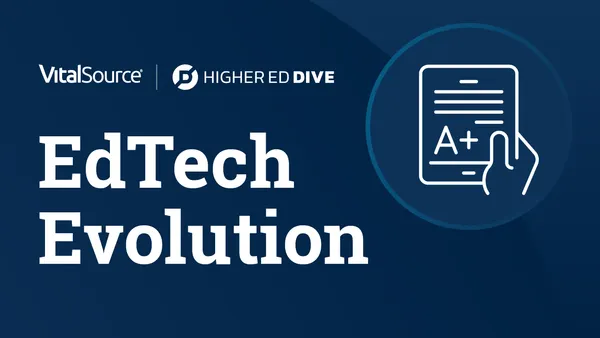Dive Brief:
- Muhlenberg College in Allentown, Pennsylvania, believes it has skillfully moved some instruction online without sacrificing the small institution's best qualities that its 2,500 students expect, according to Inside Higher Education.
- A 25-person task force with representatives from various departments, the faculty and the student body began investigating online learning options about four years ago and made several recommendations tailored to the college to move it into the realm. The group discouraged the development of massive open online courses (MOOCs).
- As a result, this summer the college is offering 19 courses online with a maximum of 23 students in each, most with a liberal arts focus. College officials are hoping to attract their own students who were going to other colleges for summer courses but wanted to attend Muhlenberg, one goal established by the task force.
Dive Insight:
The Muhlenberg group also recommended that digital learning efforts fit with the institution’s mission and reinforce the college’s reputation as a liberal arts college, but with a digital presence. It also suggested that the university collaborate with other institutions and consider prospects for a blended master’s degree program.
One online learning expert has suggested that digital courses are the best path for struggling small private institutions to survive, and said that some colleges may have to alter their belief that online courses are impersonal or lack enough guidance from an instructor because these institutions won’t survive without a digital presence.
Small private colleges are working hard to secure their future in a variety of ways, including offering an average 50% discount on tuition. Others are turning to online courses, many at the graduate level. Officials at Simmons College in Massachusetts added online graduate programs that generate more revenue than traditional undergraduate courses.
Research increasingly suggests that online courses are as good or better than traditional ones, according to EdSurge, and students are increasingly seeking them. It says to beef up enrollment and meet student demand small colleges are trying to diversify their offerings by going online, but must do it carefully.
In thinking related to Muhlenberg’s, one corporate learning specialist says that the business community is now more often considering SPOCs (small private online courses) to meet their specific employee needs with smaller, more specialized courses. “We’re trying to think of inventive new ways to ensure enjoyment and engagement and move away from typical experience in a MOOC, where it may just be a collection of short instructional videos, some readings and a machine-graded quiz,” Liz-Ann Gayle, head of innovation at FT|IE Corporate Learning Alliance, a joint venture of the Financial Times and IE Business School, said in an interview with evolllution.











